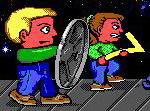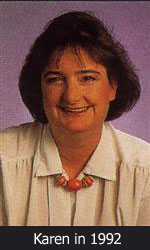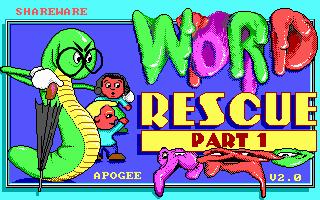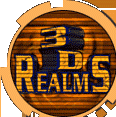The Apogee Legacy #3 - Karen Crowther
 Today we bring you the third in our "Apogee Legacy" Interview series. This week we speak with Karen Crowther (now known as Karen Chun), the author of the only two educational games in our product line. These are Word Rescue, and Math Rescue, both released in 1992. These are the only titles in our line she was involved with directly, but she's been a friend to the company for awhile now. Additionally, she's the only female lead game designer we've had. We've had other women work for us, or on our titles, but she's the only lead designer we've ever had.
Today we bring you the third in our "Apogee Legacy" Interview series. This week we speak with Karen Crowther (now known as Karen Chun), the author of the only two educational games in our product line. These are Word Rescue, and Math Rescue, both released in 1992. These are the only titles in our line she was involved with directly, but she's been a friend to the company for awhile now. Additionally, she's the only female lead game designer we've had. We've had other women work for us, or on our titles, but she's the only lead designer we've ever had.
So without further delay, we take you to Hawaii for our interview with Karen...
Past Pioneers of the Shareware Revolution
Issue #3 - Karen Crowther-Chun
1) How did you first come in contact with Apogee?
I was a fanatic Commander Keen and Duke Nukem (sidescroller) player. I love those games and still think they're the best. (And I really miss Tom Hall and his wacky sense of humor...hey, Tom, you need to visit me in Maui!!!)
Dang! My mind is going...I know Scott and I were involved in a lot of political stuff (fighting off government regulation of computer games etc. with Diana Gruber and Rosemary West - hammering out the role of shareware and making sure the authors didn't get ripped off by the retail publishers) but I think that came later.
2) Was there a reason you decided to work with Apogee, say versus going on your own or working with another company?
First, I really liked Scott Miller. He put me in touch with Todd Replogle (Duke Nukum) who helped me with some programming issues. If no one else tells you, Todd is a really great guy and pretty humble considering what a good programmer he is. Scott helped me with PC sound effects and cool ideas. And I loved interacting with George Broussard. When Joe Siegler came along, he was a lot of fun too. I think that Scott is a marketing genius.
3) Looking back, was there anything Apogee could have done better, regarding the marketing and distribution of your game?
Apogee did a great job for me. They basically let me do anything I wanted and made me a millionaire (well, started me on the way, at least). I have nothing but good stuff to say about them.
 4) Do you think your game was made better or worse by working with Apogee?
4) Do you think your game was made better or worse by working with Apogee?
Well, better, of course! When I listened to Scott, my games got better. That's why the games I distributed through Apogee are the most successful. Although Pickle Wars (distributed through another company) did become a cult classic with game developers, it never made much money despite what I think was some pretty fantastic music by Bobby Prince. So, in retrospect, I can say that Scott's instincts were right on. The games that I was paid beaucoup bucks to produce for big name retailers are dead, dead, dead now. The Apogee games (Math and Word Rescue) are still going strong.
5) Apogee had a policy of letting the designer or studio retain full intellectual property rights to their game. Nowadays, it's rare to find a publisher who allows this, especially if the publisher is providing the funding. Do you believe that it's best for the creator to retain IP rights? Why or why not?
I liked the fact that I retained the rights because I had fun wheeling and dealing. However, knowing what I know now about the way that big retail publishers can mess up, I'd probably have left more of the decision-making in Scott's hands. He has the clout to make them keep their contractual promises. But you know, at that time, we were
all winging it and learning by doing. I can say for certain, that I made more money through Apogee than any other publishers.
5a) Do you think there'll ever be a sequel to your game(s)?
I have so many people asking me to update my games to Windows. I start doing it and then I get "Polynesian Paralysis" (e.g. you start working and then you decide to go to the beach instead). Plus I absolutely HATE Windows programming. Now that I'm getting into Java and PHP programming, I might make web versions....but then again, I might go surfing instead :-)
6) Is there any story/incident that stands out as interesting during your time associated with Apogee?
No response to question.
7) Apogee was an early pioneer in terms of teaming up with external designers and studios, and continues to do so even to this day (currently working with Human Head Studios on Prey). Why is it that so few other studios do this (mentor and fund outside projects with lesser known teams)?
I tell you, my experience with big game companies is that they are by and large run by idiots. That's why. They're the typical corporation where some guy with a great line of BS comes in, dazzles the clueless bosses and then makes life difficult for the programmers, artists and so on because all he wants is a raise and promotion. Meanwhile he has no common sense and no love of the games and the things that those of us who make games value (like cool programming and having fun).
8) What the biggest difference in the industry nowadays versus when you worked with Apogee?
When I created my first games for Apogee, it was just me and the artist, doing it on spec. Nowadays the look and feel is so expensive, you need at big bucks and it is much more difficult to do a complete game on your own while your working at a day job. I still think that the Internet (in our days, BBS) is the key to new people getting started. But the retail (store shelf) arena is locked up by a few big companies.

9) What have you been doing since your time with Apogee?
I moved to Maui and started paddling outrigger canoe. I'm such a fanatic that I actually coached at 2 clubs here on Maui and have been racing...doing the 41 mile Moloka'i to 'Oahu channel race (7 hours of paddling) a couple times. I design and build houses, do webpages - some for money and some (like the Maui Sierra Club website) to give back to the world that has been so good to me.
I've always been into my kids and now I have a granddaughter (who also paddles outrigger canoe). Every morning I wake up and say to myself, "Dang, I'm living in paradise!".
10) If you're no longer making games, have you thought about returning to this industry? If not, why not?
I'm starting to get a little bored. Now that I've figured out how to make CSS and Java games, I'll probably do some small web games. I took a break for a while because I hated Windows so much. When I programmed my old games, there were just a few instructions (a tiny set of C instructions and the DOS interrupts) so you could program just about anything by being clever. Then along came Windows with API docs bigger than the San Francisco phone books! I'm not good at memorization and programming just wasn't fun anymore.
11) Looking back, are there any missed opportunities that you wish you'd have jumped on?
Not really. I had a lot of fun, got to do exactly what I wanted (be with my kids, make games, go to Maui, build houses). I had the opportunity to become more of an administrator and have Redwood Games become a big company, but I found that I didn't enjoy being a supervisor so I just took an abrupt U turn and ditched that whole scene. I like the hands-on part. In fact, I think that was the most important strength of the Apogee business model...it let people like me do exactly what we wanted to do which was the hands-on stuff and have the creative control while getting help and feedback from Scott and his team.
12) Other than your game(s), what's your favorite game released or produced by Apogee (or 3D Realms)?
That is really, really hard. It's a tie between the side-scroller Duke Nukem and the old Commander Keen games. Also I liked Blake Stone and the early 3D games.
12a) And what's your favorite 2-4 games released by anyone else?
Well nothing was as fun as the side scrollers but I really like William Soleau's puzzle games. (You can tell I am stuck back in the early 90's ;-) )
13) Is there anything else you'd like to add about your time here or to fans of your title(s)?
A big thank you to those who enjoyed my games and for continuing to enjoy them. I'm getting people now who played Math and Word Rescue when they were kids, buying the games for THIER kids. I really value the emails I get from players of my games. It gives me a real lift to know that folks appreciate what I created.

Thanks to Karen for agreeing to help out with the interview series. You can read more about Karen's life on this page at her site. Additionally, we still sell Math & Word Rescue almost 14 years after they were originally released, make sure and visit these pages for more information on them.
- Official Word Rescue Page (w/ shareware download)
- Official Math Rescue Page (w/ shareware download)
- Buy Math & Word Rescue Combo CD
- Visit Karen's Redwood Games Site
Make sure and tune in again next Monday morning, when we bring you the next in our Legacy Interview series.
Posted by Joe Siegler on January 23, 2006 at 12:36 PM | Permalink
| Discuss this story on our forums
News Categories: About 3DR / 3DR Staff | The Apogee Legacy






